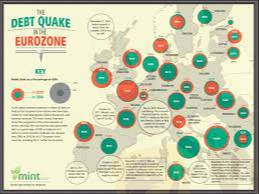
2025-02-18 01:03
IndustriyaTHE EFFECTS OF THE EUROPEAN SOVEREIGN DEBT CRISIS
#firstdealofthenewyearastylz
The European Sovereign Debt Crisis (2009–2012) had a significant impact on forex markets, mainly affecting the euro (EUR) and global currency stability. Here’s how it influenced forex trading:
1. Euro (EUR) Depreciation
Investors lost confidence in the euro due to rising debt in Greece, Spain, Italy, and other European nations.
Many traders sold off euros, causing the EUR/USD to decline sharply.
Example: In 2011, the EUR/USD fell from around 1.49 to 1.20, showing a major loss in value.
2. Flight to Safe-Haven Currencies
Traders shifted funds to safer currencies like:
US Dollar (USD) → Strengthened as investors saw the U.S. as a stable economy.
Swiss Franc (CHF) → Surged in value, forcing the Swiss National Bank (SNB) to intervene and cap its exchange rate.
Japanese Yen (JPY) → Gained strength as investors moved capital to Japan.
3. Increased Forex Volatility
The crisis caused panic selling and high uncertainty, leading to unpredictable swings in forex prices.
Central banks, like the European Central Bank (ECB), had to intervene with bailouts and stimulus programs, which also affected forex trends.
4. Weakening of Eurozone Trade Partners
Countries with close economic ties to Europe (e.g., the UK) saw their currencies affected.
The British pound (GBP) also faced pressure due to exposure to European debt.
5. Policy Actions Shaped Forex Trends
The ECB introduced quantitative easing (QE) and lower interest rates, making the euro less attractive to investors.
International financial institutions like the IMF and the EU bailout funds helped stabilize the euro over time.
Bottom Line
The European Sovereign Debt Crisis led to:
✅ Euro depreciation
✅ Strengthening of safe-haven currencies (USD, CHF, JPY)
✅ High forex market volatility
✅ Policy interventions that shaped currency movements
Katulad 0

Momo403
ब्रोकर्स
Mainit na nilalaman
Pagsusuri ng merkado
Dogecoin cheers coinbase listing as Bitcoin’s range play continues
Pagsusuri ng merkado
Grayscale commits to converting GBTC into Bitcoin ETF:
Pagsusuri ng merkado
Bitcoin's price is not the only number going up
Pagsusuri ng merkado
Theta Price Prediction:
Pagsusuri ng merkado
How to Research Stocks:
Pagsusuri ng merkado
Bitcoin (BTC), Ethereum (ETH) Forecast:
Kategorya ng forum

Plataporma

Eksibisyon

Ahente

pangangalap

EA

Industriya

Merkado

talatuntunan
THE EFFECTS OF THE EUROPEAN SOVEREIGN DEBT CRISIS
 Hong Kong | 2025-02-18 01:03
Hong Kong | 2025-02-18 01:03#firstdealofthenewyearastylz
The European Sovereign Debt Crisis (2009–2012) had a significant impact on forex markets, mainly affecting the euro (EUR) and global currency stability. Here’s how it influenced forex trading:
1. Euro (EUR) Depreciation
Investors lost confidence in the euro due to rising debt in Greece, Spain, Italy, and other European nations.
Many traders sold off euros, causing the EUR/USD to decline sharply.
Example: In 2011, the EUR/USD fell from around 1.49 to 1.20, showing a major loss in value.
2. Flight to Safe-Haven Currencies
Traders shifted funds to safer currencies like:
US Dollar (USD) → Strengthened as investors saw the U.S. as a stable economy.
Swiss Franc (CHF) → Surged in value, forcing the Swiss National Bank (SNB) to intervene and cap its exchange rate.
Japanese Yen (JPY) → Gained strength as investors moved capital to Japan.
3. Increased Forex Volatility
The crisis caused panic selling and high uncertainty, leading to unpredictable swings in forex prices.
Central banks, like the European Central Bank (ECB), had to intervene with bailouts and stimulus programs, which also affected forex trends.
4. Weakening of Eurozone Trade Partners
Countries with close economic ties to Europe (e.g., the UK) saw their currencies affected.
The British pound (GBP) also faced pressure due to exposure to European debt.
5. Policy Actions Shaped Forex Trends
The ECB introduced quantitative easing (QE) and lower interest rates, making the euro less attractive to investors.
International financial institutions like the IMF and the EU bailout funds helped stabilize the euro over time.
Bottom Line
The European Sovereign Debt Crisis led to:
✅ Euro depreciation
✅ Strengthening of safe-haven currencies (USD, CHF, JPY)
✅ High forex market volatility
✅ Policy interventions that shaped currency movements
Katulad 0
Gusto kong magkomento din
Ipasa
0Mga komento

Wala pang komento. Gawin ang una.

Ipasa
Wala pang komento. Gawin ang una.